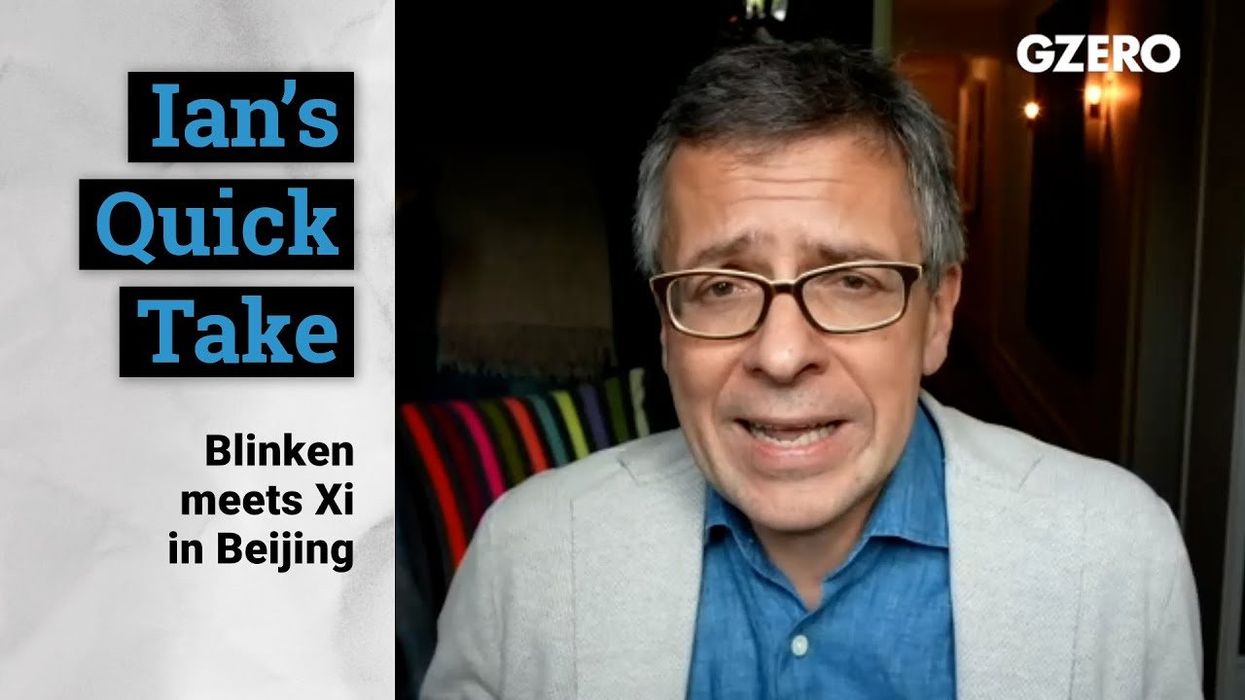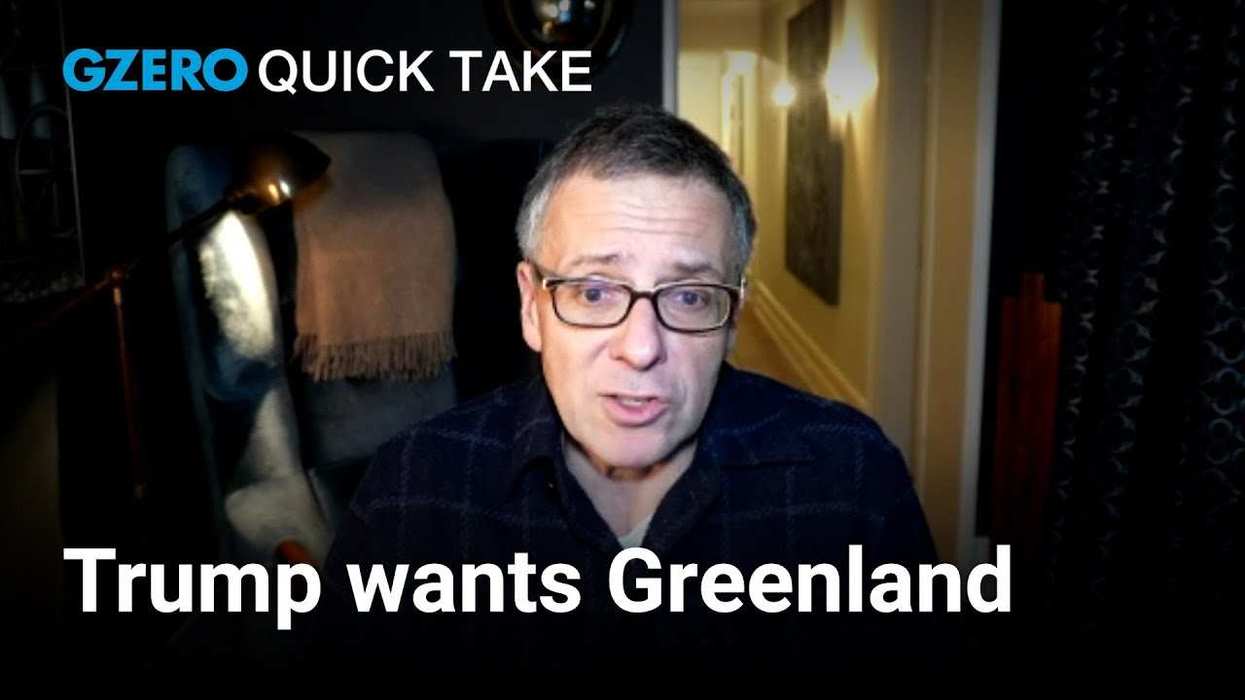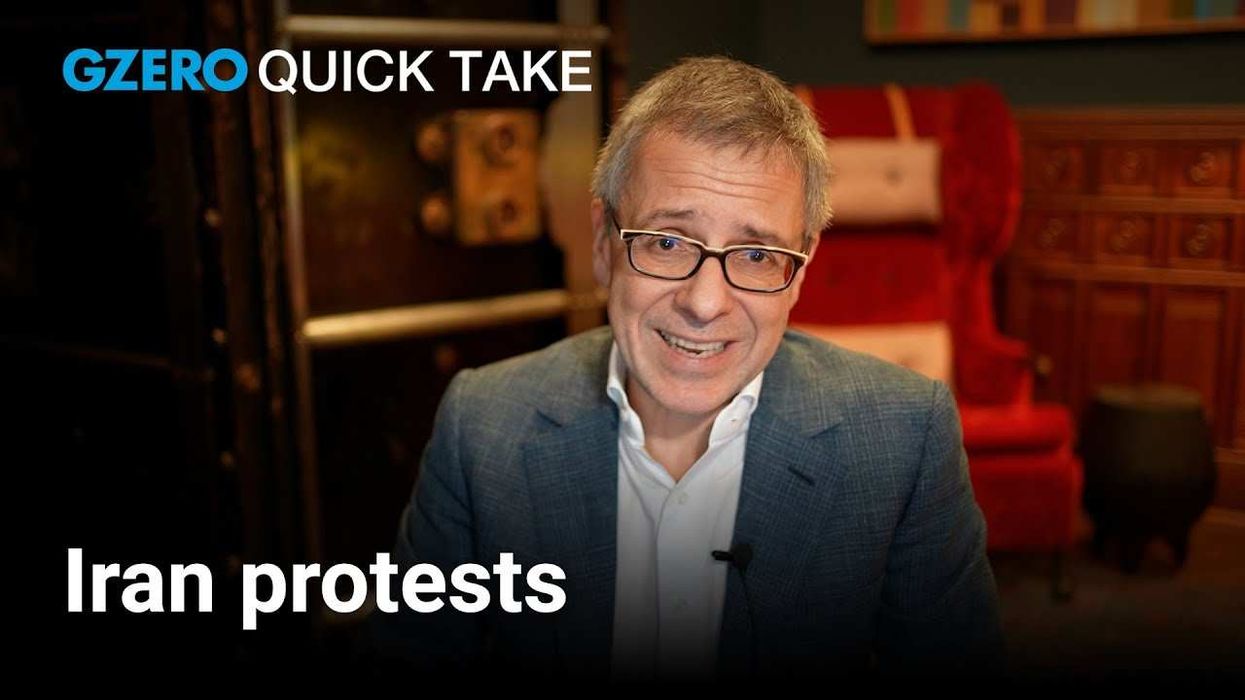VIDEOSGZERO World with Ian BremmerQuick TakePUPPET REGIMEIan ExplainsGZERO ReportsAsk IanGlobal Stage
Site Navigation
Search
Human content,
AI powered search.
Latest Stories
Sign up for GZERO Daily.
Get our latest updates and insights delivered to your inbox.
Global Stage: Live from Munich
WATCH RECORDING
Ian Bremmer's Quick Take: Hi, everybody. Ian Bremmer here, and Tony Blinken is not. No, he's coming back from Beijing, the US Secretary of State, the once-postponed and now-on-again weekend trip to Beijing. It's the first time he, as Secretary of State, has been there. Also, this was a last-moment meeting that included President Xi Jinping, and that's very important because on the ground in China, no attention being given publicly to the trip until Xi meets with Blinken, 35 minutes long, and then suddenly it is everywhere, and it's over 1 billion views, and it's all over state media, and it's all over social media. In a sense, the Chinese blessing the visit to their public and showing that they want to have a more constructive or at least stable relationship.
The other takeaway, marginal but still not unimportant, is the willingness to create a fentanyl working group. That's something the Americans have been pressing on for a while, which provides a little bit of cover for Biden that he's actually getting something done with the Chinese. Of course, the proof of the pudding is in the eating, and execution on that is something that everyone is going to be skeptical about and watching.
Okay, that's the good news. What's the bad news? There is no trust within this relationship. The US-China relationship continues to be very contentious, very conflictual. It's true that the Chinese gave their standard speaking points on Taiwan, and we can go to war, and we maintain the status quo. The Americans said, "We're not changing the status quo, and we don't want war." And everything will be fine. But the status quo is changing. The status quo is changing in a couple of ways. First of all, the Americans are doing whatever they can to make Taiwan less important. The export controls on Taiwan's semiconductors. Let's keep in mind that until very recently, until about a year ago, TSMC was producing 92% of the most important semiconductors in the world. The highest speed, smallest, fast. This is critical. Suddenly, that's down to 80%. Why? Because the Americans want to get away from vulnerability to Taiwan.
That's going to be down to 50% probably within five years. And as that happens, you've got Foxconn now moving all of their supply chain away from mainland China and towards India and Vietnam and Canada and other countries. Why are they doing that? And the answer is because the Americans see the status quo as risky, and they're trying to de-risk the status quo, which means less exposure to Taiwan, which makes a lot of sense for the Americans. But if you're the Chinese, you see that as actually leading to confrontation. You're saying, "Wait a second, we no longer have the ability to get access to this high-level technology. We have to build it ourselves." So when they do that and Taiwan becomes less important, it of course, becomes an area that's easier to have direct conflict.
Part of the reason the Americans were able to put unprecedented levels of sanctions against the Russians is because the Americans do almost no business with the Russians, Taiwan becomes less important, and the Americans de-risk the broader US-China relationship. It becomes easier to have confrontation with the Chinese, and as the Chinese take similar steps, they do the same thing. The one thing that didn't happen in this meeting was a willingness to re-engage on the military-to-military front. The Americans have been asking for it. Chinese have said no. They continue to say no this weekend. At the same time that the Chinese have taken really aggressive measures in the Taiwan Straits, in the South China Sea that potentially could risk direct accident/conflict with American military warships, jet fighters operating in the area. The fact that the Chinese are willing to tolerate that level of risk is they would argue analogous to the Americans being willing to tolerate greater levels of risk around the broader US-China relationship and around Taiwan.
That's not going to change. It's not going to change because Biden thinks he's got the right policies right now for China, because the politics of the relationship are heavily constrained by hawkish Democrats and Republicans, and because we're heading into the 2024 election. Now, the one thing that's useful is that in this relationship, Biden and Xi know each other well, they've known each other for a long time. Biden actually speaks with a lot of pride about that when you talk to him personally about how much time he spent with Xi. Not that he necessarily likes everything about him or trusts everything he says, but he respects him as a leader as opposed to Biden's view of Putin, which is exactly the opposite. That means that when they meet face-to-face, maybe there'll be a video call soon, but certainly looks likely on the sidelines of the APEX Summit in San Francisco this fall. Biden's going to go for a couple of days. That has the potential to strengthen the stabilization of the relationship, even as the structural forces are heading more towards conflict. I wish I had better news, but I'm glad the meeting happened. I'm glad it went as well as it actually did.
Keep reading...Show less
More from Quick Take
Quick Take
Feb 25, 2026
Has US–Iran diplomacy reached its end?
February 23, 2026
Supreme Court blocks Trump’s tariff power
February 20, 2026
Why Trump is pushing to take Greenland
January 18, 2026
US response to Iran protests
January 12, 2026
Maduro ousted in US raid, a major win for Trump
January 03, 2026
GZERO Series
GZERO Daily: our free newsletter about global politics
Keep up with what’s going on around the world - and why it matters.














